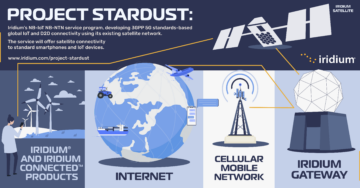
WASHINGTON — Cobham Satcom will supply as many as 170 terminals to Inmarsat for the U.S. Navy Military Sealift Command, the company said.
Inmarsat Government last year won a $578 million 10-year contract to maintain and operate the command’s communications infrastructure, including satellite systems, teleports and terrestrial services. Inmarsat also will upgrade the command’s ship-based communications systems from Ku-band to Ka-band provided by the company’s new Global Xpress satellites.
Inmarsat Government, based in Reston, Virginia, is a subsidiary of British communications satellite operator Inmarsat.
Cobham, an established supplier of terminals across the satellite industry, will provide Sailor XTR broadband satellite internet terminals for the Military Sealift Command contract. These terminals were designed for maritime platforms, the company said.
The Military Sealift Command is responsible for the Navy’s replenishment and military transport ships, and provides transportation for all branches of the U.S. military and civilian agencies.
Inmarsat Government was awarded the MSC wideband services contract in August 2022 by the Defense Information Systems Agency. The company announced Feb. 7 it will replace existing Ku-band user terminals on MSC vessels with 1-meter Sailor 1000 XTR and 0.6-meter Sailor 600 XTR Ka-band terminals.
Cobham said these terminals operate across multiple orbits so they will be able to support Inmarsat’s geostationary and highly elliptical orbit satellites, ensuring access over the Arctic region.
Inmarsat Government in October 2022 also won a 10-year contract worth $980 million from the Defense Information Systems Agency to provide broadband satellite and terrestrial communications services to the U.S. Navy.
Inmarsat is expected to be acquired by global satellite operator Viasat but the $7.3 billion deal has been held up by regulatory reviews. The European Commission is currently evaluating the merger.
- SEO Powered Content & PR Distribution. Get Amplified Today.
- Platoblockchain. Web3 Metaverse Intelligence. Knowledge Amplified. Access Here.
- Source: https://spacenews.com/cobham-satcom-will-supply-as-many-as-170-terminals-to-inmarsat-for-the-u-s-navy-military-sealift-command/
- 2022
- 7
- a
- Able
- access
- acquired
- across
- agencies
- agency
- All
- and
- announced
- arctic
- awarded
- based
- Billion
- branches
- British
- broadband
- commission
- Communications
- company
- Company’s
- contract
- Defense
- designed
- ensuring
- established
- Europa
- European
- european commission
- existing
- expected
- from
- Global
- Government
- Held
- highly
- HTML
- HTTPS
- in
- Including
- industry
- information
- Information Systems
- Infrastructure
- Internet
- IT
- Last
- Last Year
- maintain
- many
- Maritime
- Merger
- Military
- million
- multiple
- network
- New
- october
- operate
- operator
- Orbit
- Platforms
- plato
- Plato Data Intelligence
- PlatoData
- provide
- provided
- provides
- region
- regulatory
- replace
- responsible
- Reviews
- Said
- satellite
- satellites
- Services
- ships
- So
- subsidiary
- supply
- support
- Systems
- terrestrial
- The
- to
- transport
- transportation
- u.s.
- U.S. Navy
- upgrade
- User
- virginia
- will
- Won
- worth
- XTR
- year
- zephyrnet










